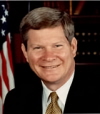SD’s Tim Johnson Coasting in Early U.S. Senate Poll

But races for the U.S. Senate in South Dakota tell a different tale: Democrats have won 5 of the past 7 races since 1986, and 9 out of the last 15 races since 1962. Overall Democrats have won 12 of 32 U.S. Senate races since popular vote elections began in 1914. The reason for this greater success in Senatorial elections is obvious: home-grown Democratic Senate candidates have generally better reflected the conservative core values and policy positions of the state’s electorate than have national Democratic presidential candidates.
These U.S. Senate races have been very competitive, with the last election in 2004 a nail-biter that saw the defeat of Democratic Senate Minority Leader Tom Daschle at the hands of John Thune by about 4,500 votes (1.2 percentage points). Since 1986, 5 out of 7 Senatorial races in South Dakota have been decided by 7 points or less, with Democrats winning 3 of these very competitive contests.
Given the competitive nature of South Dakota Senate races, two-term Democratic incumbent Senator Tim Johnson was on the GOP’s very, very short list of possible pick-ups in 2008. Johnson’s health problems stemming from an arteriovenous malformation in December 2006 have not deterred his political career, and the state’s popular senior Senator announced last October that he would seek a third term.
Rasmussen has just released the first public poll of potential GOP matchups with Senator Johnson, and it appears the GOP list of possible pick-ups just got even shorter. Highlights from the Rasmussen poll of 500 likely voters:
- Against ex-Lieutenant Governor Steve Kirby, Johnson holds a 62 to 32 percent edge.
- Against State Representative Joel Dykstra, Johnson’s margin is measured at 63 to 28 percent.
The Rasmussen poll also confirms what is widely known and felt across the Mount Rushmore State—Senator Johnson is widely popular, boasting a 73 percent favorability rating.
